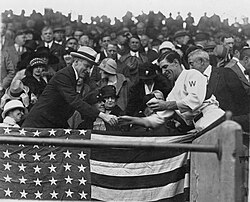| 1924 World Series | ||||||||||
|---|---|---|---|---|---|---|---|---|---|---|
 Washington manager Bucky Harris presents U.S. President Calvin Coolidge with the baseball used to open the 1924 World Series. | ||||||||||
| ||||||||||
| Dates | October 4–10 | |||||||||
| Venue(s) | Griffith Stadium (Washington) Polo Grounds (New York) | |||||||||
| Umpires | Tommy Connolly (AL), Bill Klem (NL) Bill Dinneen (AL), Ernie Quigley (NL) | |||||||||
| Hall of Famers | Umpires: Tommy Connolly Bill Klem Senators: Goose Goslin Bucky Harris (2B/manager) Walter Johnson Sam Rice Giants: John McGraw (manager) Frankie Frisch Travis Jackson George Kelly Freddie Lindstrom Billy Southworth‡ Bill Terry Hack Wilson Ross Youngs ‡ Elected as a manager | |||||||||
| Broadcast | ||||||||||
| Radio | Westinghouse | |||||||||
| Radio announcers | Graham McNamee | |||||||||
| ||||||||||
The 1924 World Series was the championship series of the 1924 Major League Baseball season. The 21st edition of the World Series was a best-of-seven playoff matching the American League (AL) champion Washington Senators against the National League (NL) champion New York Giants, with the Senators defeating the Giants in seven games to win their first championship in club history.
Contents
- Summary
- Matchups
- Game 1
- Game 2
- Game 3
- Game 4
- Game 5
- Game 6
- Game 7
- Composite line score
- Notes
- See also
- References
- External links
The Giants became the first team to play in four consecutive World Series, winning in 1921–1922 and losing in 1923–1924, and their veteran manager, John McGraw, made his ninth and final World Series appearance. The deciding game of the Series was decided in extra innings, the second such occurrence in MLB history (the first had occurred in 1912).
Walter Johnson, nearing the end of his playing career at age 36, made his first ever World Series appearance, having completed his first 20-win season since 1919 (with 23 wins). He lost both of his two starts, but was awarded a win in Game 7 with a relief appearance in which he held the Giants scoreless over the final four innings, helping the Senators secure their first championship. Game 7 is widely considered one of the most dramatic in World Series history.
Johnson struck out 12 Giants batters in Game 1 in a losing cause. Although that total matched Ed Walsh's number in the 1906 World Series, it came in 12 innings. Johnson struck out only nine in the first nine innings.
In Game 7, with the Senators behind 3–1 in the eighth, Bucky Harris hit a routine ground ball to third which hit a pebble and took a bad hop over Giants third baseman Freddie Lindstrom. Two runners scored on the play, tying the score at three. Walter Johnson then came in to pitch the ninth, and held the Giants scoreless into extra innings. With the score still 3–3, Washington came up in the 12th. With one out, and runners on first and second, Earl McNeely hit another grounder at Lindstrom, and again the ball took a bad hop, scoring Muddy Ruel with the Series-winning run.
This was the first World Series to use the 2–3–2 home game pattern, which would be adapted as the permanent format beginning the following year. [1]
This was the Senators' only World Series championship victory during the franchise's time in Washington. In 1961, the Senators relocated to Minnesota and were rebranded as the Twins, and subsequently won the World Series in 1987 and in 1991. This would be the last World Series win for a Washington based team until the Washington Nationals, who were originally the Montreal Expos, won the World Series in 2019, 95 years after the Senators' only triumph.
In 2020, ESPN named it the third greatest World Series of all-time. [2]

